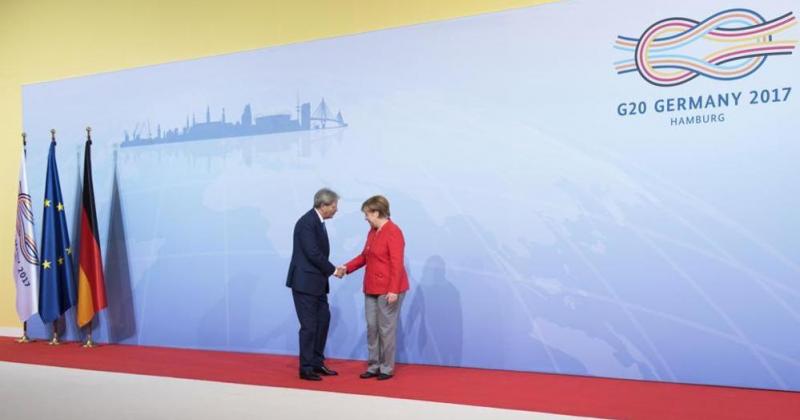Letter from Francis to the heads of state gathered in Hamburg: “Stop the present arms race and give absolute priority to the poor and refugees”
“Enough with these useless slaughters! War is never a solution”. Benedict XV’s appeal after the outbreak of the First World War reverberates in Pope Francis’ message to the heads of the Group of 20 nations, who are gathered in Hamburg, Germany from July 7-8. Pope Francis wants to draw Leaders’ attention to the tragedies plaguing people and nations, like the one in South Sudan, Lake Chad, the Horn of Africa and Yemen, “where there are 30 million people who have no food and water to survive.”
Recalling Schuman, De Gasperi, Adenauer, and Monnet’s example, the Pontiff asked the global leaders to make a serious commitment to “reject armed conflicts”, to “stop the arms race” as “these bring exclusion, waste and even death,” and giving priority to “ the poor, refugees, the suffering, evacuees and the excluded, without distinction of nation, race, religion or culture.” The final goal - he writes in the letter addressed to German Chancellor Angela Merkel to shape a new era of development that is innovative, interconnected, sustainable, environmentally respectful and inclusive of all peoples and all individuals”
In particular, Bergoglio - who expressed his appreciation for the efforts being made to “ensure the governability and stability of the world economy” - looks at the global problem of migration, which is the summit’s central theme. It is a “dramatic event,” he says, “inseparable from the issue of poverty and exacerbated by armed conflicts” demonstrating how “the gravity, complexity and interconnection of world problems is such that there can be no immediate and completely satisfying solutions”.
Francis suggestion is, therefore, “to set in motion processes that can offer solutions that are progressive and not traumatic, and which can lead in relatively short order to free circulation and to a settlement of persons that would be to the advantage of all”. Today, “time is greater than space,” he observes, and “this tension between space and time, between limit and fullness” requires “an exactly contrary movement in the minds of government leaders and the powerful.” In their hearts and minds, there is a need to give “absolute priority” to the poor and refugees, without distinction.
Because an effective solution, necessarily spread over time, will be possible “only if the final objective of the process is clearly present in its planning”.
Then the Pope addressed a heartfelt appeal for the tragic situations in South Sudan, the Lake Chad basin, the Horn of Africa and Yemen, “A commitment to meet these situations with urgency and to provide immediately support to those peoples will be a sign of the seriousness and sincerity of the mid-term commitment to reforming the world economy and a guarantee of its sound development”.
In the message, the Bishop of Rome then says he “feels bound to ask that the world put an end to all these “useless slaughters”. “War - he says, recalling Benedict XV’s Letter to the Leaders of the Warring Peoples - “is never a solution.” “All parties must commit themselves to substantially reducing levels of conflict, halting the present arms race and renouncing direct or indirect involvement in conflicts, as well as agreeing to discuss sincerely and transparently all their differences.”
“The goal of the G20 and of other similar annual meetings is to resolve economic differences peacefully and to agree on common financial and trade rules to allow for the integral development of all, in order to implement the 2030 Agenda and the Sustainable Development Goals.” “Yet that will not be possible - the Pope says, persisting in this “tragic contradiction and inconsistency in the apparent unity expressed in common forums on economic or social issues, and the acceptance, active or passive, of armed conflicts.”
Bergoglio also warns against “new ideologies of absolute market autonomy and financial speculation” that replaced the fateful ideologies of the first half of the twentieth century.” He says, “In their tragic wake, these bring exclusion, waste and even death.” In order to counteract them, it is necessary to stick to that “healthy and prudent pragmatism” that has determined the political and economic successes of the last century, “guided by the primacy of the human being and the attempt to integrate and coordinate diverse and at times opposed realities, on the basis of respect for each and every citizen.” That same pragmatism of the Fathers of Europe and of all those “European and world leaders who consistently gave pride of place to dialogue and the quest of common solutions”.
In conclusion, Francis calls for a direct appeal to the G20 summits, asking them to broaden their reflection and not focus solely on “the small number of countries that represent 90% of the production of wealth and services worldwide”, but also to think of “Those states and individuals whose voice is weakest on the world political scene are precisely the ones who suffer most from the harmful effects of economic crises for which they bear little or no responsibility.” At the same time, the Pontiff emphasizes, “This great majority, which in economic terms counts for only 10% of the whole, is the portion of humanity that has the greatest potential to contribute to the progress of everyone.”
Hence an invitation “to make constant reference to the United Nations, its programmes and associated agencies, and regional organizations, to respect and honour international treaties, and to continue promoting a multilateral approach, so that solutions can be truly universal and lasting, for the benefit of all.”
